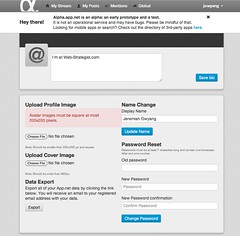Screenshot of App.net shows a bare bones microblogging platform
So why does App.net have an uphill battle to reach mass market? I’d argue that while niche premium social networks may emerge, however they’ll only serve a small market. The majority of the addressable mass market is already accustomed to advertising in other media channels, so being exposed to highly relevant ads in will be worth the . The other option, is to head the Wikipedia business model way, and depend on revenue injections from other parties, or raised funds on a donation based model as we see Jimmy Wales compelling ads requesting donations.
So why did I give my $50 commitment to App.net despite the massive uphill challenges they’ll face? Well, for three reasons: 1) It’s my job as a research analyst to know the market which I cover 2) Selfishly, I wanted to secure my user name jowyang (just as I have on Twitter) and 3) I’m interested in seeing if crowd funding models can work –despite the concern over Kickstarter scams.
| Premium (App.net) | Freemium (Facebook, Twitter) | |
| Business Model | Users pay up front, in the case of App.net, $50 for a year of service, site is funded by users | Free tools available to any who agree to Terms of Service, such as Google+, Twitter, Facebook. Business model often includes marketing, advertising, donations. |
| Data Usage | As paying customers, data is controlled and managed by users, developers, and owners. Users able to export data at any time via download feature. | Terms of service often indicate the data can be used by social network and is owned by social network. |
| Governance | Managed by website owners, not clear if customer council, app developers may have upfront info on API changes. | Roadmap defined by social network, developers, brands, and users at mercy of changes, often without advance notice. |
| User Experience | Advertising free experience, with focus on social and engagement features. | Ad rich experience, including marketing and advertising directly in social stream. In the case of G+ it supports Search business model and remains ad free. |
| Market Type | At this time, early adopters, first world technologists. May incline towards disposable income and influentials | Mass market, global. |
When it comes to social networks like Facebook and twitter, we should all remember that these are free global communication tools, and nothing comes without a price, including seeing marketed content. When it comes to new business models that are advertisement free, we should also remember, you either pay now, or pay later, to use these tools.
So users and developers of social networks (whether premium or freemium) should recognized you’ll pay now, or pay later, you always pay.
Update: Well that didn’t take long, here’s the parody site. There’s more discussion on my G+ feed on this.

Comments are closed.